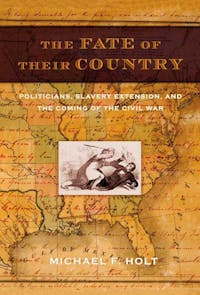The Fate of Their Country
Politicians, Slavery Extension, and the Coming of the Civil War
 Download image
Download image
ISBN10: 0809044390
ISBN13: 9780809044399
Trade Paperback
192 Pages
$18.00
CA$24.00
What really brought about the Civil War? Leading historian Michael F. Holt convincingly offers a disturbingly contemporary answer: partisan politics. In this brilliant, original, and succinct study, Holt demonstrates that secession and war did not arise from two irreconcilable economies any more than from moral objections to slavery: shortsighted politicians were to blame. Rarely looking beyond the next election, the dominant political parties used the emotionally charged and largely chimerical issue of slavery's extension westward to pursue the election of their candidates and settle political scores, all the while inexorably dragging the nation toward disunion.
Despite the majority opinion (held in both the North and South) that slavery could never flourish in the areas that sparked the most contention from 1845 to 1861—the Mexican Cession, Oregon, and Kansas—politicians in Washington, especially members of Congress, realized the partisan value of the issue and acted on short-term political calculations with minimal regard for sectional comity. War was the result.
Complete with a brief appendix of excerpted writings by Lincoln and others, The Fate of Their Country openly challenges us to rethink a seminal moment in America's history.
Reviews
Praise for The Fate of Their Country
"This fascinating study of partisan politics and the territorial slavery issue shows again why Michael Holt is one of America's finest pre-Civil War historians."—William W. Freehling, author of The South vs. the South: How Anti-Confederate Southerners Shaped the Course of the Civil War
"Informative . . . A thought-provoking book. [Holt's] writing is interesting and pleasant to read. He has boiled the issues down and makes the overall issue easy to understand and the events themselves clear and concise . . . [This study] quickly defines how politics impacted the national attitude."—John Benson, Civil War Book Review
"A readable, intelligent, and highly competent survey of the intense sectional controversies that arose over the issue of the extension of slavery to the western territories from the 1840s until the outbreak of war . . . [A] commendable effort."—James Nuechterlein, First Things
"Focused and accessible, of value to scholars and students as well as to the general reader seeking guidance on the political trajectory of sectional conflict before the Civil War. To the core narrative the author has appended eight important primary documents, each helpfully introduced; these include letters and speeches by such key actors as Cass, Clay, Seward and Lincoln, as well as two Whig Presidents, Zachary Taylor and Millard Fillmore, whose roles in the late antebellum drama Holt is uniquely equipped to evaluate."—Martin Crawford, Journal of American Studies
"Holt has distilled a lifetime of scholarship in this impressive account of America's greatest political crisis. There is no better introduction to the intricate yet explosive politics of the 1850s."—Harry L. Watson, University of North Carolina at Chapel Hill
"A superb account of the nation's descent into civil war. A skilled political historian, Michael Holt focuses on the decisions that political leaders made, their arousal of the most divisive passions, and their loss of control of a system present in American life."—Joel H. Silbey, author of Martin Van Buren and the Emergence of American Popular Politics
"While modern historians often focus on the activities of marginalized groups that lacked true political power, the well-respected Holt reaffirms the importance of politics and politicians as he re-examines the often studied coming of the Civil War. This short volume reiterates a thesis Holt offered earlier in The Rise and Fall of the American Whig Party, which declares that the war resulted from a series of political decisions and actions relating to the extension of slavery rather than moral or social differences over slavery. This concise book, with four chapters focusing on significant political events of the prewar period and a useful appendix of primary sources, makes Holt's theories available to a wider audience. Reference to the current conflict in Iraq demonstrates the continuing importance of Holt's approach. Likely to be used for years to come, this work is highly recommended for academic and public libraries of all sizes."—Library Journal
"University of Virginia historian Holt provides an elegant, brief analysis of the partisan political forces that, via the great debate over the extension of slavery into the American West, eventually plunged the United States into civil war. Holt discounts the view that the war arose inevitably from two irreconcilable economies as well as the more naïve interpretation that it derived from righteous Northern outrage over slavery. Instead he argues that shortsighted and self-absorbed politicians from both the South and the North (their agendas focused, for the most part, on simple re-election) needlessly exploited the slavery-extension debate and escalated the associated rhetoric to a crescendo that finally made disunion inevitable. Holt provides brilliant thumbnail portraits of such key players as Abraham Lincoln, John C. Calhoun, Henry Clay, James K. Polk, Daniel Webster, and Stephen A. Douglas. He also offers vitally lucid analyses of such key legislative issues as the Wilmot Proviso, the Compromise of 1850, and the Kansas-Nebraska Act. Stating his case in a nutshell, Holt writes, 'At few other times in American history did policy makers' decisions have such a profound—and calamitous—effect on the nation as they did in the 1840s and 1850s.'"—Publishers Weekly
Reviews from Goodreads
BOOK EXCERPTS
Read an Excerpt
The Fate of their Country
1
PANDORA'S BOX
In the winter of 1860-61, as one Deep South state after another seceded in a furious reaction to the November election of the Republican Abraham Lincoln as President,...


